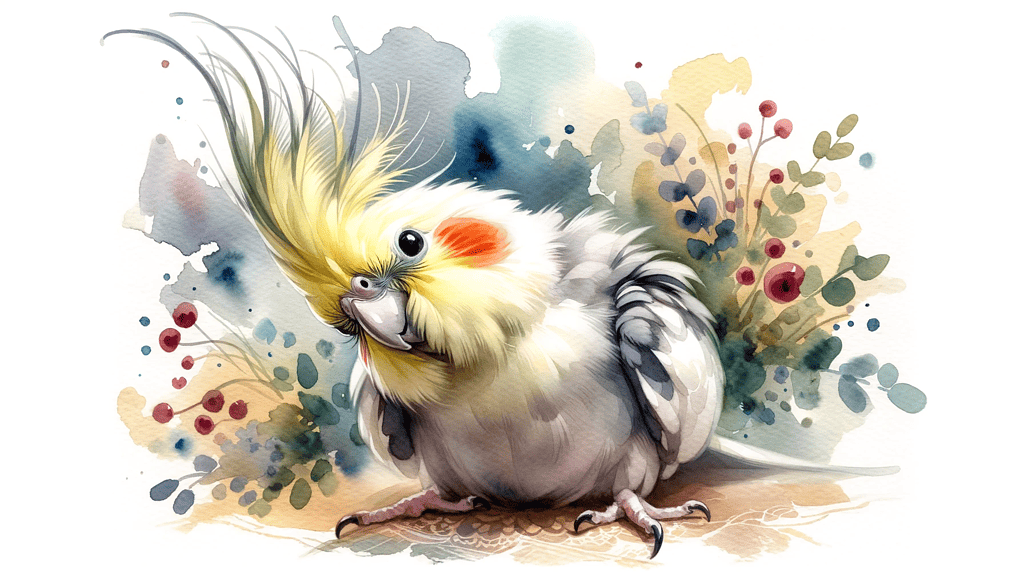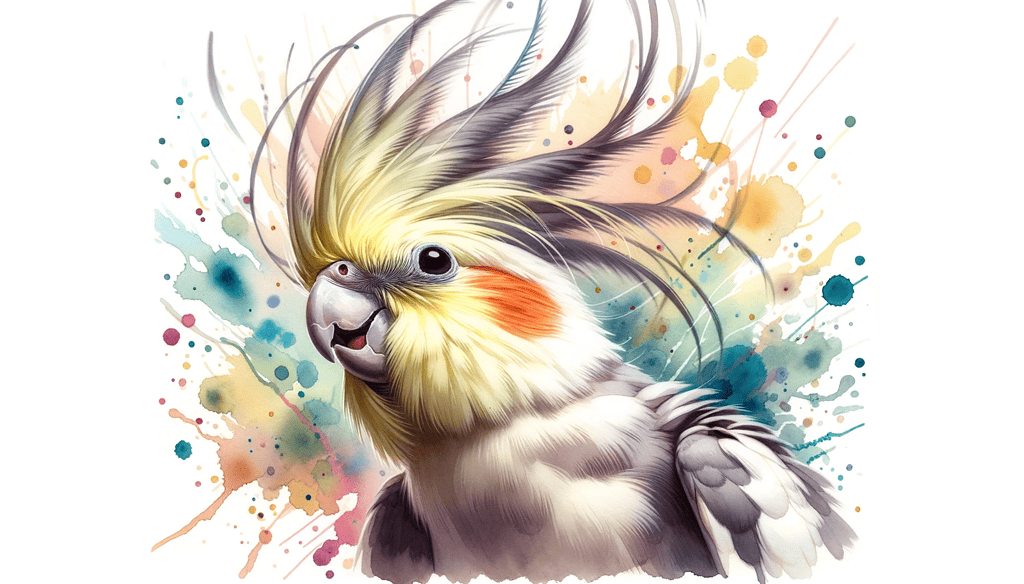
Have you ever observed a cockatiel closely and wondered about its peculiar head-bobbing behavior? What does it signify, and why do these charming birds engage in such a unique display?
As a general rule, cockatiels bob their heads for various reasons, ranging from communication and mating rituals to enhancing vision and hearing. This behavior is deeply rooted in their natural instincts and can provide insights into their mood, health, and needs.
Dive deeper with me as we unravel the mysteries behind this fascinating behavior, understanding its significance, and learning how it strengthens the bond between you and your feathered friend.
Before we delve into the specifics, let’s set the stage. Imagine you’re observing your cockatiel from across the room. Suddenly, it starts bobbing its head. You might wonder, “Is it trying to communicate with me? Is it feeling alright?” Well, let’s unravel the mystery behind this peculiar behavior.
Boredom
Cockatiels, like many other animals, can exhibit peculiar behaviors when they’re feeling bored. One such behavior is head bobbing. If you’ve ever noticed your cockatiel intensifying its head bobbing as you approach its cage, it’s likely trying to grab your attention. Just like cats and dogs, birds require a good amount of mental and physical stimulation daily. Without this, they might develop behaviors to signal their discontentment. It’s essential for your bird to have ample interaction with you and a variety of toys in its environment to keep itself entertained. Moreover, it’s beneficial for them to spend several hours outside their cage daily.
Hunger
Head bobbing can also be a sign of hunger, especially in young cockatiels. If you’ve ever seen a young cockatiel bobbing its head, it’s often an indication that it’s hungry and awaiting its feeding session. This behavior is most commonly observed in very young cockatiels that are still being hand-fed. As they grow older, this specific reason for head bobbing tends to diminish. Sometimes, along with head bobbing, baby cockatiels might also twitch their wings, signaling their parents that they’re hungry and ready for a feeding.
Frequency of head bobbing in relation to the age of the cockatiel:
| Age of Cockatiel | Frequency of Head Bobbing due to Hunger |
| 1-2 weeks old | Very Frequent |
| 3-4 weeks old | Frequent |
| 5-6 weeks old | Occasional |
| 7-8 weeks old | Rare |
| Adult | Very Rare |
Dancing
One of the most delightful sights for a cockatiel owner is watching their feathered friend dance and bob its head to music. Yes, you read that right! Cockatiels, with their vibrant personalities, often react to music by bobbing their heads, swaying, and even tapping their feet. This isn’t just a random behavior; it’s their way of expressing joy and entertainment. Over the years, I’ve observed that cockatiels have a preference for certain rhythms and beats. It’s a heartwarming experience to see them resonate with music, reminding us of the deep emotional capacities these birds possess.
Popular songs or sounds that cockatiels often react to:
- Whistling tunes, especially those that are repetitive.
- Classical music with pronounced beats.
- Pop songs with catchy rhythms.
- Sounds of nature, like rain or chirping of other birds.
- Television theme songs or jingles.
Aggression
I’ve noticed that these birds, like many others, have their own ways of expressing aggression. One of the signs of an aggressive cockatiel is head bobbing, especially when it’s accompanied by hissing or lunging. This behavior is often territorial in nature. If you see your cockatiel bobbing its head aggressively, it might be signaling a warning to another bird or even to you. It’s essential to understand this behavior and give your bird the space it needs during such times.
Happiness
On the brighter side, head bobbing can also be a sign of sheer joy and contentment. When your cockatiel is in a good mood, perhaps after a fulfilling meal or a playful session, you might notice it bobbing its head in a relaxed manner. This is their way of expressing happiness and showing that they’re comfortable in their environment. It’s moments like these that remind us of the deep bond we share with our feathered companions.
Looking for a Mate

Nature has its unique ways, doesn’t it? Cockatiels use head bobbing as part of their mating rituals. When a male cockatiel is trying to woo a female, he might bob his head, puff up his feathers, and serenade her with his songs. It’s a sight to behold and a clear indication of the bird’s intent to court its mate.
Regurgitation
Regurgitation in cockatiels is often misunderstood by many bird owners. While it might seem like a cause for concern, it’s usually a sign of affection. When a cockatiel bobs its head and then regurgitates, it’s often trying to feed someone it’s bonded with, be it another bird or even its owner. This behavior is deeply rooted in their natural instincts, where parents regurgitate to feed their young. However, frequent regurgitation without any apparent reason can be a sign of health issues, so it’s essential to monitor and consult a vet if you’re concerned.
Anxiety
Rapid head bobbing can sometimes be an indicator of stress or discomfort in cockatiels. It’s essential to differentiate between the usual, rhythmic head bobbing and the rapid, erratic bobbing that’s often a sign of anxiety. Factors like a change in environment, loud noises, or the presence of potential threats can trigger such behavior. As a responsible bird owner, it’s crucial to ensure that your cockatiel’s environment is calm, consistent, and free from stressors.
Correlation between the speed of head bobbing and levels of anxiety:
| Speed of Head Bobbing | Level of Anxiety | Possible Causes |
| Slow and rhythmic | Low | Contentment, curiosity, or listening |
| Moderate | Medium | Mild discomfort or seeking attention |
| Rapid and erratic | High | Stress, fear, or potential threats |
Enhanced Vision and Hearing
Nature has equipped cockatiels with a unique mechanism to enhance their vision and hearing. Due to the positioning of their eyes, they might tilt or bob their heads to get a clearer view of something that intrigues them. Similarly, if they hear a sound that piques their interest, they might bob their heads to determine the direction and distance of the sound source.
I’ve personally observed a cockatiel tilting its head and bobbing it slightly to get a clearer view of a toy or a treat. It’s fascinating how these birds use head bobbing as a tool to perceive their environment better.
Seeking Attention
Cockatiels are social birds that thrive on interaction and attention. Head bobbing can often be a sign of a cockatiel trying to show off or seeking attention. Whether it’s to get you to play with them, give them a treat, or just to get a reaction, these birds know how to use their charm. Especially during their younger years, cockatiels might use head bobbing as a playful gesture to engage with their owners.
In the world of cockatiels, head bobbing is more than just a quirky behavior. It’s a language, a mode of expression, and a tool for better perception. As you spend more time with your feathered friend, you’ll begin to understand the nuances of this behavior, strengthening the bond you share with your cockatiel.
Conclusion
It’s evident that these charming birds have a myriad of reasons for their head bobbing behavior. From communication to mating rituals, each bob and nod tells a unique story. As we’ve explored, understanding these behaviors not only deepens our bond with these feathered companions but also ensures their well-being.
Did you find this article enlightening? We’d love to hear your thoughts in the comments below. If you enjoyed it, please consider sharing with fellow bird enthusiasts to spread the knowledge!
Frequently Asked Questions
Why Do Cockatiels Bob Their Heads?
Cockatiels bob their heads for various reasons, including communication, mating, enhanced vision, and listening.
Is Head Bobbing a Sign of Happiness in Cockatiels?
While it can indicate contentment, head bobbing isn’t exclusively a sign of happiness. It can also signal other emotions or needs.
Why Do Cockatiels Bob Their Heads to Music?
Music can be entertaining for cockatiels. When they bob their heads to tunes, it’s a sign of them enjoying the rhythm.
Is Head Bobbing a Sign of Illness in Cockatiels?
While occasional head bobbing is normal, excessive or erratic bobbing, especially when accompanied by other symptoms, can indicate health issues.
